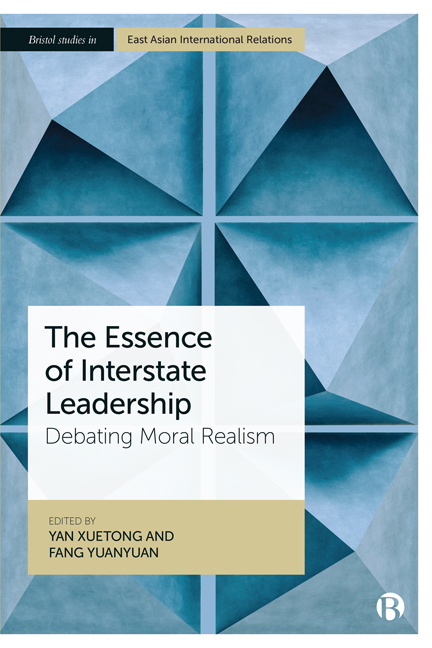Book contents
- Frontmatter
- Contents
- List of Abbreviations
- Notes on Contributors
- Preface
- 1 Interstate Leadership, Moral Realism, and their Critics
- 2 IR Moral Realism as a Universal Theory
- 3 Moral Realism as an Alternative Approach to the Agent-Structure Problem
- 4 Prospects, Promise, and Limitations of Moral Realism
- 5 Ideal Morality and Realist Interest of Moral Realism
- 6 The Conception of Morality in Moral Realism
- 7 Moral Realism and Hegemonic Transition
- 8 Innovation of Moral Realism and Dialogue with It
- 9 Moral Realism and Sino-American Relations
- 10 Moral Realism on Interstate Leadership in Response to Critics
- Appendix 1 Written Discussion between Rajesh Rajagopalan and Yan Xuetong
- Appendix 2 ‘Chinese School’ as an Inappropriate Title
- Selected Bibliography
- Index
5 - Ideal Morality and Realist Interest of Moral Realism
Published online by Cambridge University Press: 18 January 2024
- Frontmatter
- Contents
- List of Abbreviations
- Notes on Contributors
- Preface
- 1 Interstate Leadership, Moral Realism, and their Critics
- 2 IR Moral Realism as a Universal Theory
- 3 Moral Realism as an Alternative Approach to the Agent-Structure Problem
- 4 Prospects, Promise, and Limitations of Moral Realism
- 5 Ideal Morality and Realist Interest of Moral Realism
- 6 The Conception of Morality in Moral Realism
- 7 Moral Realism and Hegemonic Transition
- 8 Innovation of Moral Realism and Dialogue with It
- 9 Moral Realism and Sino-American Relations
- 10 Moral Realism on Interstate Leadership in Response to Critics
- Appendix 1 Written Discussion between Rajesh Rajagopalan and Yan Xuetong
- Appendix 2 ‘Chinese School’ as an Inappropriate Title
- Selected Bibliography
- Index
Summary
Yan Xuetong's Leadership and the Rise of Great Powers is a path- breaking project, which integrates ancient Chinese philosophy, historical and contemporary cases, and modern international relations (IR) theory. Yan proposes ‘moral realism’ – a new realist theory – to explain the rise of great powers as well as the transformation of international order. He argues that ‘political leadership serves as the core independent variable’ in explaining why only a ‘few rising states have been able to replace the dominant state’. In addition, he suggests that political leadership can also account for the changing international power configurations, norms, orders, and systems.
His argument is parsimonious and elegant, fitting the golden standard of the political science discipline because his ‘moral realism’ theory has only one key variable – political leadership – which explains the power dynamics, the transformation of international order, as well as the rise and fall of international norms. It is really ambitious and provocative because political scientists normally draw a clear explanatory boundary around their theories in order to avoid academic criticisms. For example, Kenneth Waltz, the founding father of neorealism, famously stated that neorealism is a theory of IR, not a theory of foreign policy because it cannot explain ‘why state X made a certain move last Tuesday’. On the contrary, Yan claims that the explanatory power of ‘moral realism’ can cross three different levels of analysis: individual, state, and system.
Moreover, moral realism has already bridged materialism and ideationalism in that morality and norms – two ideational variables in constructivism – are well integrated with material power in Yan's definition of ‘political leadership’. It is obvious that Yan's ‘moral realism’ has posed some tough challenges to the major canons of contemporary IR theory. Although scholars might not necessarily agree with Yan's arguments, they will be inspired by many insights from the book, which will in turn encourage them to seek new light through both theoretical innovation and empirical investigation in IR.
In this review chapter, I first highlight some major contributions of Yan's book to both IR theory building and the study of China's rise. Namely, it takes leadership in IR seriously, breaks the boundary between materialism and ideationalism, and crafts bold but nuanced predictions on the US– China competition in the future.
- Type
- Chapter
- Information
- The Essence of Interstate LeadershipDebating Moral Realism, pp. 74 - 92Publisher: Bristol University PressPrint publication year: 2023



